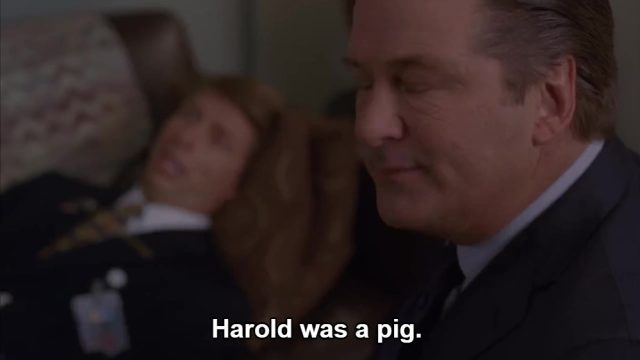From his opening scene in the pilot, Jack Donaghy’s role on 30 Rock is to be the bad guy without being the villain. He’s an overprivileged Republican white man who aims to make as much money as possible, climb his way to the top, and make the systems that support this as efficient and effective as possible; he’s also completely dedicated to being a good friend, sincerely giving Liz advice with the hopes of improving her situation and sense of self. Comedically, he can effortlessly swap between being a clown – when he’s being rudely arrogant, insulting, or heterosexual – and being the comic foil to the revolting way Liz treats her body or her middle-aged white woman tastes.
It’s through this that the show often feels like somebody exorcising something. The thing that initially makes Liz unlikeable is that she’s putting on a pretence and expects everyone else to do that too – she believes that we have to act a certain way, and she beats herself up for failing to live up to it, following it up with beating up others. Jack serves as both a literal (if soft) antagonist, being someone who embodies his personal goals and resistant to any kind of control over him, and as a model for an alternate way of thinking.
Having Jack explicitly represent Evil ends up freeing us to ask how much of his behaviour actually is Evil; I nearly clarified that previous sentence with “even in the banal context of being a slight dick on a TV set”, but as a matter of fact, it’s one hundred percent appropriate to refer to Jack’s elitism and arrogance as evil. There are two kinds of evil in this world, my friend: things that are actually evil, like murder or rape or whatever, and things that aren’t of any real consequence but just irritate us on a fundamental level. Jack’s particular kind of evil – self-interest at the expense of the social contract and self-indulgence in sensory delights – are the kind of thing that just bug Liz and she tries to both correct and act above.
(Perhaps Liz bugs ‘us’ because she is to us as Jack is to her – she is the part of us that pretends to be something we aren’t. This is something to analyse for another time)
So what does Jack get out of elitism? Certainty. Elitism isn’t particularly useful as a critic; Liz doesn’t listen to Jack any more than he listens to her. But as a creative force, Jack is relentless. He always knows exactly what he likes and dislikes, and he can use that as a guide for generating his own action; he is less concerned with actually policing the behaviours of others and more about living up to his ideal of a Cool Dude (indeed, we have a whole episode about how he chooses not to mentor most people because he recognises it’s a waste of time with all but the elite few). He takes disappointment in the world comfortably so long as he respects himself.
That mixture of self-knowledge and acceptance of the world is what gives him his charisma – it’s fun to empathise with the pleasure he takes in every action he does, and you know that while he’d make fun of you (and possibly say “Good God!” to the things you put in and on your body) he wouldn’t actually do anything to try and stop you. This is something Liz gradually learns off him; she takes his insults in stride because hey, what does she care what he thinks about the things that bring her pleasure? He’s not gonna do anything. Just dismiss him as a whiner with bad taste and get on with your day. That’s what he would do, and it works.

